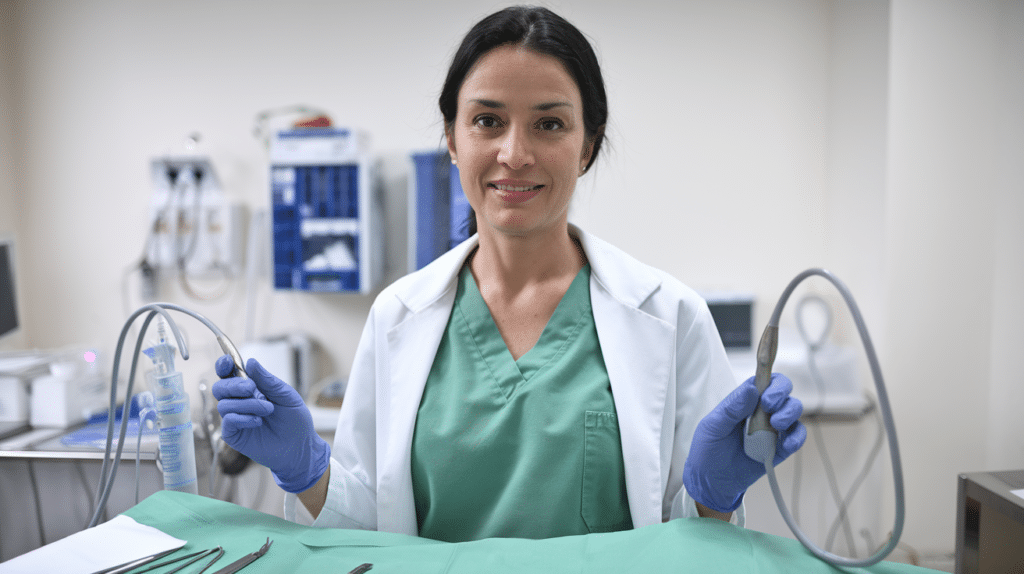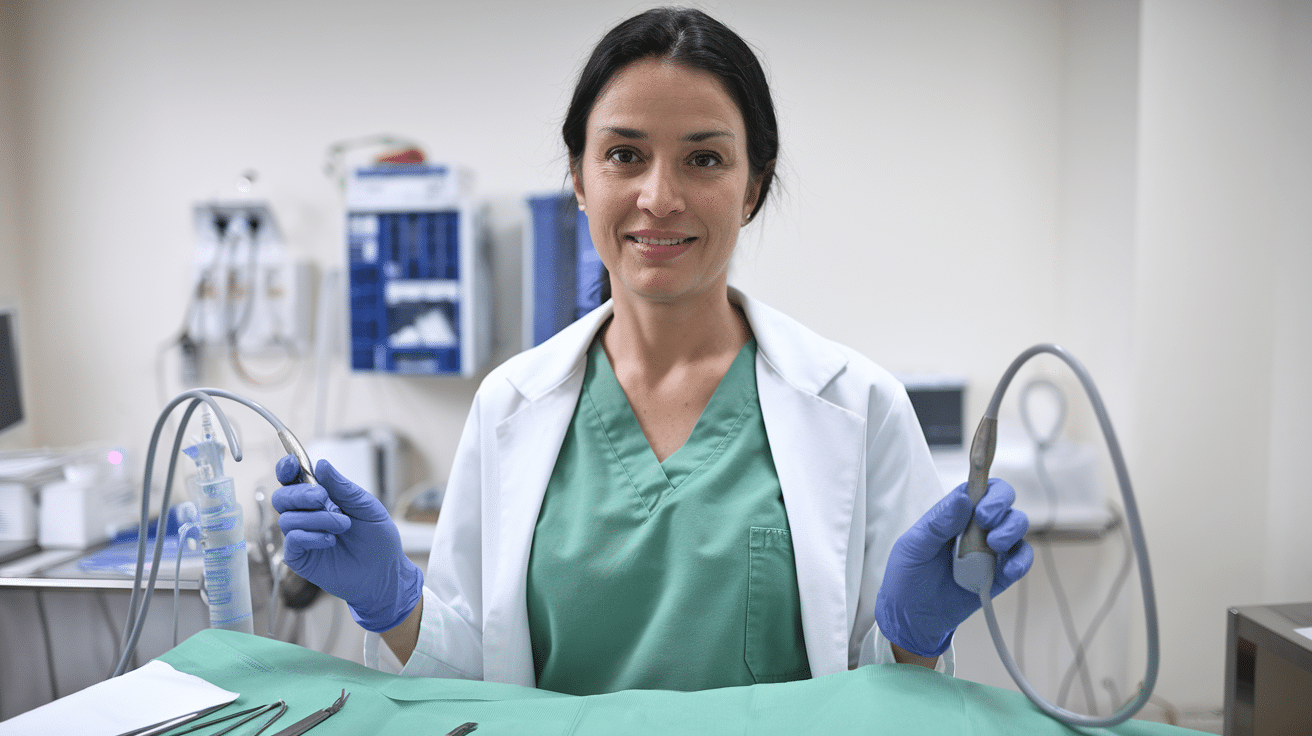If you want to start a career as a medical assistant in your preferred state in the U.S., then you must understand the scope of practice in that particular state.
The scope of practice defines the duties that medical assistants are legally permitted to perform, and it can vary significantly between states.
So, understanding the scope of practice for medical assistants is essential for those in the profession and aspiring to join it.
In this article, we’ll discuss the duties of a medical assistant and their scope of practice by the state.
Moreover, we’ll also talk about a self-paced medical assistant program that could make you job-ready faster at an affordable price, without driving to college or without student loan debt.
So, let’s get started.

What are the Duties of a Medical Assistant?
Medical Assistants perform a wide array of duties that are essential for the smooth functioning of healthcare facilities.
They help bridge the gap between patients and healthcare providers, ensuring that patient care is comprehensive and efficient.
Below are the duties Medical Assistants are expected to handle:
Patient Intake and Preparation
One of the primary responsibilities of a Medical Assistant is to assist with patient intake. This involves taking vital signs like blood pressure, temperature, and pulse, along with recording the patient’s medical history and reason for the visit.
When a patient arrives at a doctor’s office, they might first greet them and escort them to the examination room. They then measure the patient’s blood pressure, check their weight, and ask about any new symptoms.
This information helps the physician understand the patient’s current health status and make informed decisions during the consultation.
Assisting in Medical Procedures
Medical Assistants often assist physicians or nurses during medical procedures, acting as a second pair of hands. This could range from minor surgeries and wound dressing to routine diagnostic tests.
In a dermatology clinic, a Medical Assistant may assist a physician during a biopsy by preparing the sterile instruments, handing them to the doctor when needed, and later applying a dressing to the biopsy site.
They may also ensure the patient is comfortable and answer any immediate questions.
Administering Medications and Injections
Medical Assistants, under the supervision of a physician, may be responsible for administering medications or vaccines to patients. They need to follow proper protocols to ensure patient safety.
In a pediatric clinic, they might administer routine vaccinations to children, explain potential side effects to the parents, and monitor the child for any immediate reactions.
They also ensure accurate record-keeping regarding the medications provided.
Performing Diagnostic Tests
Medical Assistants are trained to perform certain diagnostic tests, including drawing blood (phlebotomy), collecting urine samples, and conducting electrocardiograms (EKGs). These tasks help the medical team diagnose and treat conditions efficiently.
In a cardiology clinic, they may perform an EKG on a patient experiencing chest pain. After placing the electrodes on the patient’s body and recording the heart’s electrical activity, they ensure the results are delivered to the cardiologist for review.
Managing Medical Records
Medical Assistants are often tasked with maintaining and updating patient medical records, ensuring that they are accurate and up-to-date in both electronic and paper formats.
After a patient visit, they might update the electronic health record (EHR) system with the physician’s notes, prescribed medications, and follow-up instructions. This ensures that future medical visits are informed by the latest patient data.
Scheduling Appointments and Billing
In addition to clinical duties, Medical Assistants handle administrative tasks like scheduling patient appointments, processing insurance claims, and managing billing information.
After a patient consultation, they may schedule the patient’s follow-up appointment and confirm their insurance details for billing. They may also communicate with insurance providers to ensure claims are processed accurately and on time.
Patient Education and Support
Medical Assistants often provide patients with instructions for managing their health outside of the clinic. They explain treatment plans, medication regimens, and lifestyle recommendations as directed by the physician.
In a diabetic care clinic, they might demonstrate how to use a glucose monitor, explain dietary adjustments, and provide guidance on administering insulin. This support helps patients manage their condition more effectively at home.
Medical Assistant State-by-State Scope of Practice
The scope of practice defines the duties that medical assistants are legally permitted to perform, and it can vary significantly between states.
This variation is influenced by state laws, regulations, and the preferences of supervising physicians.
Below, we outline the key aspects of medical assistants’ roles across the United States, emphasizing the differences in permitted tasks and responsibilities.
Scope of Practice in Alabama
Medical assistants in Alabama are permitted to perform basic clinical tasks, such as recording vital signs and administering injections, as delegated by a supervising physician.
Tasks that require higher levels of medical judgment or invasive procedures typically fall outside the scope of medical assistants.
Scope of Practice in Alaska
Alaska allows medical assistants to conduct a range of clinical and administrative tasks under a physician’s supervision, but more invasive procedures like starting intravenous lines or administering anesthesia are restricted to more advanced practitioners.
Scope of Practice in Arizona
In Arizona, Medical assistants are able to perform tasks such as drawing blood and conducting basic laboratory tests. The state requires that all procedures performed by Medical assistants be explicitly delegated by a supervising healthcare professional.
Scope of Practice in Arkansas
Medical assistants perform basic administrative and clinical tasks like vital sign measurement, patient preparation, and assisting with simple medical procedures under physician oversight.
Scope of Practice in California
California has stringent regulations for medical assistants. While they can administer injections and assist in medical procedures, tasks involving more complex medical decision-making are not permitted.
Medical Assistants must complete a specific training program and receive certification to carry out tasks like administering medications.
Scope of Practice in Colorado
Colorado permits medical assistants to engage in various clinical tasks as long as they are supervised by a licensed physician.
However, activities that involve independent clinical judgment or invasive procedures are beyond their scope.
Scope of Practice in Connecticut
The scope in Connecticut is narrower; medical assistants typically perform administrative work, assist with exams, and conduct basic clinical tasks. Procedures involving direct medical treatment often require additional certification or the presence of a licensed provider.
Scope of Practice in Delaware
Tasks allowed include recording vital signs, patient preparation, and administering medications as authorized by a supervising doctor.
Scope of Practice in Florida
Florida’s scope allows medical assistants to perform injections, draw blood, and assist with minor office surgeries, provided they have been appropriately trained and certified. The supervising physician holds the responsibility for ensuring the medical assistant’s competence.
Scope of Practice in Georgia
In Georgia, Medical assistants can perform most non-invasive clinical tasks, such as taking medical histories and assisting in examinations. The state also permits the administration of injections, under the physician’s direct order.
Scope of Practice in Hawaii
Medical assistants may assist with routine clinical procedures, record vital signs, and manage administrative duties. The scope does not include invasive procedures or medication administration without certification.
Scope of Practice in Idaho
Medical assistants in Idaho are authorized to conduct a range of clinical duties, including administering injections and assisting with minor procedures, under physician supervision.
Scope of Practice in Illinois
Illinois allows medical assistants to assist in various clinical capacities, but tasks like medication administration or any procedure that involves puncturing the skin require certification or special delegation by a physician.
Scope of Practice in Indiana
The state allows medical assistants to take patient histories, measure vital signs, and assist physicians with exams. More complex tasks may require special training or certification.
Scope of Practice in Iowa
Medical assistants in Iowa may conduct basic clinical and administrative tasks under a provider’s delegation. Procedures involving deeper medical intervention are restricted.
Scope of Practice in Kansas
Permitted duties include patient prep, recording medical information, and performing basic lab tasks. Invasive procedures and advanced tasks require physician oversight.
Scope of Practice in Kentucky
Medical assistants can assist with clinical duties, including drawing blood and taking patient histories. However, administering medication requires supervision.
Scope of Practice in Louisiana
Medical assistants may engage in general patient care, perform injections, and manage routine lab work with appropriate supervision.
Scope of Practice in Maine
Permitted duties involve basic patient care and administrative tasks. More invasive clinical tasks require special delegation and training.
Scope of Practice in Maryland
Medical assistants can perform basic clinical tasks under direct supervision. The state requires training for MAs to administer medications or conduct more technical procedures.
Scope of Practice in Massachusetts
Medical assistants are allowed to perform basic clinical duties like patient assessments and drawing blood, under physician delegation.
Scope of Practice in Michigan
Medical assistants can conduct clinical and administrative duties, including patient interaction and preparation, under the guidance of a supervising physician.
Scope of Practice in Minnesota
Medical assistants may perform a variety of basic clinical tasks, but direct physician oversight is needed for more advanced procedures.
Scope of Practice in Mississippi
Medical assistants can engage in non-invasive clinical work, recording vital signs, and patient assistance. Advanced procedures are limited and require training and supervision.
Scope of Practice in Missouri
Medical assistants are permitted to perform tasks, including patient preparation, vital sign collection, and simple lab work. More complex procedures need physician approval.
Scope of Practice in Montana
Medical assistants can perform clinical duties such as drawing blood, administering injections, and recording patient information under supervision.
Scope of Practice in Nebraska
Medical assistants may conduct a wide range of basic clinical and administrative duties under a supervising provider. Advanced tasks like medication administration require certification.
Scope of Practice in Nevada
The state allows Medical assistants to assist with exams, prepare patients, and record vital signs. Medication administration requires further training.
Scope of Practice in New Hampshire
Medical assistants can perform a range of patient care and administrative tasks, with physician oversight required for more complex procedures.
Scope of Practice in New Jersey
Medical assistants are allowed to perform clinical duties like phlebotomy and administer injections under physician supervision.
Scope of Practice in New Mexico
Permitted to perform a variety of patient care tasks under a licensed provider’s guidance. Tasks involving medical decision-making are restricted.
Scope of Practice in New York
New York’s regulations are among the strictest. Medical assistants can assist with routine clinical tasks such as recording vital signs, and patient histories and assisting during examinations.
However, they cannot independently administer medications or perform invasive procedures; such tasks require direct physician involvement and adherence to specific protocols.
Scope of Practice in North Carolina
Medical assistants may engage in basic patient care and some clinical tasks under the supervision of a physician. Procedures involving greater medical complexity are limited.
Scope of Practice in North Dakota
Permitted duties include routine patient care, administrative tasks, and basic clinical tasks under physician delegation.
Scope of Practice in Ohio
Medical assistants can perform a variety of administrative and basic clinical duties but require direct supervision for medication administration or invasive procedures.
Scope of Practice in Oklahoma
Medical assistants can perform patient care tasks, such as recording medical histories and taking vital signs. More advanced tasks require physician oversight.
Scope of Practice in Oregon
Medical assistants in Oregon can perform a broad range of tasks, including administering injections, under the direct supervision of a licensed provider.
Scope of Practice in Pennsylvania
Allowed to conduct non-invasive patient care and administrative tasks. Administering medication requires further certification and supervision.
Scope of Practice in Rhode Island
Medical assistants may assist with basic clinical and administrative tasks, with physician supervision needed for more advanced procedures.
Scope of Practice in South Carolina
Medical assistants can perform basic patient care, draw blood, and take vital signs. Medication administration must be supervised by a licensed professional.
Scope of Practice in South Dakota
Permitted duties include taking patient histories, recording vital signs, and performing basic clinical tasks under supervision.
Scope of Practice in Tennessee
Medical assistants may engage in routine clinical and administrative duties with physician oversight. Medication administration requires proper training and certification.
Scope of Practice in Texas
Medical assistants can perform clinical tasks such as drawing blood, administering injections, and recording patient data, under direct supervision.
Tasks involving direct patient treatment often require delegation from a physician and proof of competency through training.
Scope of Practice in Utah
The state allows medical assistants to conduct patient care activities and administrative tasks under physician delegation.
Scope of Practice in Vermont
Medical assistants can perform a variety of non-invasive clinical tasks and help with administrative duties under physician oversight.
Scope of Practice in Virginia
Permitted duties include patient preparation, recording vital signs, and conducting basic clinical tasks. However, additional training may be needed to administer medications.
Scope of Practice in Washington
Washington permits medical assistants to perform tasks like drawing blood, administering injections, and assisting with exams.
Medical assistants must complete accredited training and become certified to perform these tasks. The state mandates supervision by a licensed provider, who delegates responsibilities while ensuring patient safety.
Scope of Practice in West Virginia
Medical assistants may assist with clinical and administrative tasks, such as recording patient information and preparing patients for exams, under physician supervision.
Scope of Practice in Wisconsin
Medical assistants are allowed to perform patient care tasks, manage administrative duties, and conduct clinical activities under the direction of a healthcare provider.
Scope of Practice in Wyoming
Medical assistants in Wyoming can engage in a variety of basic clinical and administrative tasks, but more complex procedures need special delegation by a licensed physician.

A Program That Could Make You Job-Ready for Any State in the US
If you’re aiming for a career that equips you with medical assisting in any state, then you need comprehensive education and practical experience. So, you can gain essential knowledge and hands-on skills.
The course should align with national standards and preferably should come from a reputed institution.
So, when it comes to choosing a medical assistant program, Preppy’s Online Self-Paced Medical Assistant Training Program stands out as an exceptional option for aspiring medical assistants.
Designed to cater to busy adults seeking a flexible, affordable, and faster entry into the healthcare field, Preppy’s program is tailored to help students complete their training and enter the workforce efficiently.
Introducing Preppy’s Self-Paced Medical Assistant Training Program
Preppy’s self-paced medical assistant training program is an ideal solution for those looking to enter the healthcare field quickly and affordably.
With its online flexibility, real-world externship opportunity that provides experience, and university-backed certification, this program is an excellent option for anyone seeking a career change or starting their healthcare journey.
Here’s what you get with Preppy:
100% Online and Self-Paced
One of the most attractive features of Preppy’s program is its fully online, self-paced format. This allows students to study at their own pace, from the comfort of their homes, without the pressure of a fixed schedule.
Whether you have a full-time job, family obligations, or other commitments, you can fit the program around your life, making it highly adaptable for adults with diverse needs.
The flexibility ensures that you can fast-track your learning, depending on your personal situation.
Accredited and Recognized
Accreditation is a crucial factor when choosing any educational program, and Preppy’s Medical Assistant Training Program is through an accredited source.
This means that the course meets industry standards, ensuring that students receive a high-quality education.
Graduating from an accredited program enhances employability, as most healthcare employers prefer candidates who have completed accredited courses, ensuring they meet the required competencies.
University Certificate
Upon successful completion of the program, students receive a certificate of completion from Auburn University, a prestigious institution with over 150 years of academic excellence.
This affiliation adds credibility to your qualifications, enhancing your employability in the job market.
Recognition from a reputable university makes your certification more valuable and helps you differentiate yourself from other candidates.
Externship Opportunity
While the coursework is online, Preppy also offers an externship opportunity to provide real-world experience.
These externships allow students to gain hands-on experience in medical settings, which is essential for developing practical skills.
Preppy ensures that students are placed close to their location, minimizing the need for travel and enabling them to apply what they’ve learned in real clinical environments.
You Could Become CCMA Certification-Ready
Preppy’s program equips you with the necessary skills and knowledge so you could become ready for the certification exam like the CCMA by NHA.
Affordable Tuition
Traditional medical assistant programs can be costly, often leading to significant student loan debt.
However, Preppy offers an affordable alternative. The tuition for Preppy’s program is competitively priced, at $1599, making it accessible for a broader range of students.
This affordability eliminates financial barriers and allows you to pursue a rewarding career in healthcare without the stress of high tuition costs.
Faster Completion Time
While many full-time programs take up to a year or more, you could finish this course in as little as 4 months. This accelerated timeline allows you to jumpstart your career and start working as a medical assistant sooner.
24/7 Support
Preppy understands the importance of support in online learning environments. The program provides 24/7 access to student support, ensuring that you can get help with academic or technical questions at any time.
Whether you need assistance with coursework, help navigating the online platform, or advice on career placement, Preppy’s support team is available to guide you throughout your educational journey.
So, if you want to become job-ready as a medical assistant faster, at an affordable price, without driving to a medical school then Preppy’s Self-Paced Medical Assistant Training Program could be the best option.
In Conclusion
We hope this article could enlighten you about the scope of practice of medical assistants by state.
Understanding the state-specific scope of practice is crucial for medical assistants and their employers to ensure compliance and high-quality patient care.
While states like California and Washington have comprehensive regulations requiring training and certification, others have more flexible practices.
Medical Assistants should stay informed and align their skills with their state’s regulations to maximize their roles and responsibilities.
Ultimately, if you’re looking for a program that could make you ready for a medical assisting career in any state, then check out Preppy’s Self-Paced Medical Assistant Training Program.
Read More:
Medical assistant





